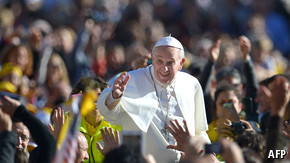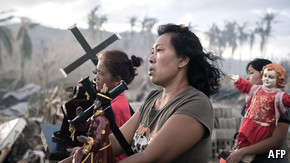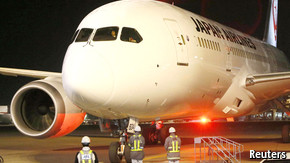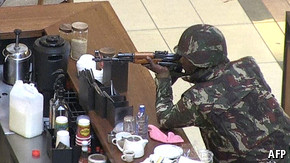

盘点2013年国际重大新闻
生活杂谈 - 2013/12/31 13:36:05
Syria’s use of chemical weapons in an attack that killed hundreds of people thrust the country’s civil war to the top of the agenda in Western capitals. But the...
Syria’s use of chemical weapons in an attack that killed hundreds of people thrust the country’s civil war to the top of the agenda in Western capitals. But the resolve by some governments to punish the Assad regime with an American-led missile strike crumbled after the British Parliament surprisingly rejected such action. Russia brokered a deal, backed by the UN and America, under which Syria is destroying its chemical stockpile. The war rumbles on. The UN estimates that three-quarters of Syria’s population will need aid in 2014.
叙利亚政府军据信在一次进攻中使用了化学武器,杀死了数百人,从而使这个国家的内战摆在了西方国家首都的首要议事日程上。就在以美国为首的西方国家惩罚阿萨德政权的导弹打击一触即发之际,英国国会出乎意料地否决了本国的介入。俄罗斯则担起了中间人,在联合国和美国的支持下促成了一项协议,以叙利亚摧毁库存的化学武器了事。战争仍在持续。联合国估计在2014年,将有四分之三的叙利亚平民需要帮助。
Civil strife enveloped Egypt when Muhammad Morsi, its Islamist president, was ousted by the army after days of street protests against his government that were bigger than the anti-Mubarak demonstrations in 2011. A crackdown on the Muslim Brotherhood led to more bloodshed; most of its leaders were imprisoned.
比2011年反穆巴拉克游行示威还要声势浩大的,针对埃及的伊斯兰主义总统默罕默德 穆尔西的街头抗议持续数日后,军方罢黜了这位民选总统,使埃及笼罩在内战的阴影下。对穆斯林兄弟会的镇压导致了更多的流血冲突,目前其大部分领袖都被关进了大牢。
Pakistan’s election marked the country’s first civilian transition of power at the end of a full five-year term. Nawaz Sharif returned as prime minister; he had last held the job in 1999. Bombings and mayhem continued unabated. At least 50 people were killed on the day that Mr Sharif held a press conference with David Cameron, Britain’s prime minister, that discussed security issues.
巴基斯坦大选标志着建国以来首个完成5年任期的民选政府进行了权力交接。纳瓦兹 谢里夫再次当选总理,他最近的一次任职还是在1999年。爆炸和袭击仍此起彼伏。在谢里夫总理和英国首相大卫 卡梅隆讨论安全议题并举行新闻发布会的当天,至少有50人被杀害。
Although less frequent than in previous years, American drone strikes against militants in Pakistan were bitterly condemned by its government. Drone technology was also more widely talked about elsewhere for other purposes, such as distributing aid to rural areas and delivering packages.
尽管没有去年那么频繁,美国无人机攻击巴基斯坦境内的恐怖主义分子的行为仍遭到巴政府的强烈谴责。别处的人们仍在广泛讨论将无人机技术应用与其他用途,比如向偏远地区运送救援物资和投递包裹。
Iraq had its worst year for sectarian violence since 2008, with over 8,000 people killed.
伊拉克经历了自2008年以来宗派暴力最为血腥的一年,共有超过8000人死亡。
The nutcracker
胡桃夹子
A new governing coalition was formed in Italy, headed by Enrico Letta of the centre-left Democrats, after an election in which a quarter of Italians registered their discontent by opting for a new party led by a comedian. Mr Letta got on with the serious business of trying to reduce public debt. The fun ended for Silvio Berlusconi when he was booted out of the Senate, after having been definitively convicted of a crime for the first time.
在四分之一的意大利人将选票投给一个喜剧演员领导的新政党以发泄对现状不满的大选结束后,意大利组成了以中左翼政党民主党的恩里科 莱塔为首的新联合政府。莱塔总理继续进行努力削减公共债务的正事。西尔维奥 贝卢斯科尼则被戏剧性地踢出了参议院,之后肯定会以首次被定罪收场。
Cyprus became the fourth country in the euro zone to get a full bail-out, though only after an anxious week in which it had to resubmit a plan to restructure its banks. Ireland became the first country to exit its bail-out programme.
在经历了得不得重新递交重组银行系统计划的慌乱的一周后,塞浦路斯成为欧元区第四个获得完全救助的国家。爱尔兰成为首个彻底退出救助的国家。

Pope Benedict shook the Catholic church by stepping down, the first pope to retire in 600 years. His successor, Pope Francis, an Argentine Jesuit, shook the church further by saying it should worry less about sexuality and by moving to reform the Vatican.
教皇本笃十六世的辞职震惊了天主教会,他是600年来首位主动退位的教皇。他的继任者,教皇弗朗西斯,一位阿根廷耶稣会士,说同性恋行为并不那么令人担忧,并承诺推动罗马教廷改革,此举使教会更为震惊。
Tech companies dominated the year’s business news. Twitter completed a successful IPO, with its share price up 73% on the first day of trading. Struggling Black Berry called off a deal whereby its largest investor would have taken it private; it then sacked its chief executive. And Microsoft bought Nokia’s mobile-device business.
本年度的商业新闻被科技公司主导。推特成功启动IP0,其股票在首个交易日上涨了73%。处于困境中的黑莓取消了出售交易,最大的投资者会寻求将其私有化。随后它解雇了自己的首席执行官。微软收购了诺基亚的移动设备业务。
Dell rebooted its business by agreeing to a $25 billion offer from its founder, Michael Dell, to take it private, but not before rebellious investors submitted a counterbid for the computer-maker. Dell’s was the largest buy-out since the start of the financial crisis in 2007.
在戴尔的创始人迈克尔 戴尔同意向戴尔公司注资250亿美元,将其私有化之后,戴尔公司重新开张,而在此之前,激进投资者曾为这家电脑制造商递交了报价。戴尔是2007年金融危机开始后最大的一宗全面收购案。
Some of the world’s big central banks got new governors, including Raghuram Rajan at the Reserve Bank of India, Haruhiko Kuroda at the Bank of Japan and Mark Carney at the Bank of England. Janet Yellen was picked to be chairwoman of America’s Federal Reserve; Ben Bernanke steps down early next year. Investors spent most of the year anticipating the start of the Fed’s“ tapering” of its asset-buying programme.
世界上几家最大的央行更换了新的管理者,包括印度储备银行的格赫拉姆 拉扬,日本银行的黑石东彦和英格兰银行的马克 坎尼。珍妮特 耶伦被提名为美联储主席,而本 伯南特将于明年早些时候离职。投资者本年度大部分时间都在期待美联储开始逐步减少其资产购买计划。
Glad tidings we bring
带给我们的喜讯
Most stock markets in Europe and America had a good year (those in emerging markets did not fare so well). The Dow Jones Industrial Average had broken a score of record highs by the beginning of December.
欧美大部分的股票市场今年迎来了牛市(新兴市场则表现一般)。道琼斯工业平均指数在12月初达到了创纪录的高点。
China’s new leadership under Xi Jin ping announced the boldest set of reforms for decades. These included more market pricing and a promise to abolish labour camps. China also further relaxed its one-child policy, in place since the 1970s, by allowing parents to have two children if one of the parents is an only child. In 2012 $2 billion-worth of fines were imposed on families that broke the one-child rule.
Xi带领的中国领导层宣布了几十年来最大胆的改革方案。其中包括更多的市场定价机制和废除劳教制度。中国也放松了其在上世纪70年代颁布的独生子女政策,允许夫妻双方有一方是独生子女的家庭要二胎。在2012年,对违反独生子女政策的罚款达到了20亿美元。
China tried to stamp its authority on its region by imposing an air defence zone over a swathe of the East China Sea that covers islands contested by Japan. Japan and America ignored China’s demand that it should be notified about flight plans by sending aircraft into the zone without warning. In December China accused Japan of “malicious slander” for suggesting its zone was threatening stability.
中国通过在东海设立防控识别区,覆盖与日本存在争议的岛屿的形式,试图在本地区树立起权威。日本和美国在未经通报的境况下派飞机进入该识别区,漠视了中国要求通过识别区的飞机应通报其飞行计划的规定。在12月中国指责日本暗示识别区的建立威胁地区稳定的言论是“恶意诋毁”。
In March North Korea startled the world when it said it was preparing for a “state of war” with South Korea. Kim Jong Un, the North’s young dictator, closed the year by executing his uncle for forming “factions” against him.
今年三月,朝鲜宣布与韩国进入“战争状态”,从而震惊世界。朝鲜的年轻独裁者金正恩在年终的时候,以“拉帮结派”反对自己而处决了自己的姑父。
Edward Snowden provoked a debate about government mass-surveillance programmes when he leaked classified documents about the activities of America’s National Security Agency. The extent of the snooping angered many, though Mr Snowden was accused of putting the security of America and its allies at risk. Some of those allies, including Angela Merkel of Germany and Dilma Rousseff of Brazil, were furious that their personal communications had been monitored.
在爱德华 斯诺登泄露了关于美国国家安全局(NSA)活动的机密文件后,激起了关于政府大规模监听计划的争论。尽管斯诺登先生被指控将美国和其盟友的安全置于危险境地,监听的存在还是激怒了很多人。其中一些盟友,包括德国的安吉拉 默克尔和巴西的迪尔马 罗瑟夫,对她们的私人通话遭到监听十分愤怒。

Typhoon Haiyan unleashed some of the strongest winds ever recorded at up to 315kph (195mph), leaving at least 6,000 people dead in the Philippines.
台风海燕释放出有记录以来最强烈的大风,最大风速达到了315千米每小时(195英里每小时),造成了菲律宾至少6000人的死亡。
Israel’s general election returned Binyamin Netanyahu to power. After two months of tortuous negotiations he formed a broad coalition government and appointed Tzipi Livni, who leads the Hatunah party, as chief negotiator with the Palestinians.
以色列大选宣布了内塔尼亚胡的重新执政。经过两个月的反复磋商,他成立了一个宽泛的联合政府,并任命Hatunah党党首齐皮 利夫尼为巴以和谈的首要谈判代表。
Joyful and triumphant
喜悦和成功
Among other big elections, Angela Merkel’s Christian Democrats won a third term in Germany and formed a grand coalition with the centre-left Social Democrats. She is the only leader in the euro zone to have been re-elected since the start of its debt crisis. Australia went through three prime ministers over the course of the year; the centre-right Liberals, led by Tony Abbott, won an election. Michelle Bachelet became Chile’s president again; her first term ended in 2010. Malaysia’s ruling Barisan Nasional coalition had its worst election showing since 1969; it still formed a government. And Uhuru Kenyatta was declared the victor in a presidential election in Kenya. His trial at the International Criminal Court on charges of orchestrating the ethnic violence that followed Kenya’s 2007 election begins in February.
在别的大选中,德国的安吉拉 默克尔率领的基督民主党赢得了第三任期,和中左翼的社会民主党组成了宽泛的联合政府。在欧债危机爆发后,她是欧元区唯一一个获得连任的领导人。澳大利亚今年迎来了三任总理,托尼 阿博特率领的中右翼政党自由党赢得了大选。米歇尔 巴奇莱特重选党员为智力的总统,她首届任期于2010年结束。马来西亚执政的国民阵线获得了自1969年以来的最差支持率,但仍然完成了组阁。乌胡鲁 肯雅塔当选为肯尼亚的总统。国际刑事法院将于明年2月对他在2007年大选后精心策划的种族清洗指控进行审讯。

Problems with battery systems led to the temporary grounding of Boeing’s new 787 Dream liner around the world. It was the first time America’s Federal Aviation Administration had grounded a type of aircraft since 1979.
波音新787梦想客机的电池问题导致了世界范围内的紧急迫降。这是1979年以来美国联邦航空管理局首次迫降某种型号的飞机。
In Bangladesh the collapse of a building that housed clothing factories killed 1,100 workers. They had been ordered to return to work despite warnings about cracks in the structure. It was South Asia’s worst industrial disaster in 30 years.
孟加拉国一家服装厂建筑的倒塌造成了1100名工人的死亡。他们是在建筑物存在裂缝的情况下仍被命令重返工作岗位。这是东南亚近30年来最严重的工业灾难。
Ding-dong merrily on high
叮当欢乐颂
America’s government was temporarily shut down for the first time in 17 years, after a bickering Congress failed to pass a spending bill. The Republicans frustrated the White House with their blocking tactics, causing the Democrats to introduce a curb on filibustering in the Senate. Barack Obama’s approval ratings headed to the emergency room after the botched roll-out of his health-care reforms.
在针尖对麦芒的国会拒绝通过支出法案后,美国政府在17年内首次暂时关门。共和党使用阻断策略阻挠白宫,导致民主党在参议院采取措施拒绝阻碍法案通过。在巴拉克 奥巴马的医保法案陷入困境后,他的支持率陷入冰点。
In Turkey a protest against developing a park in Istanbul snowballed into nationwide demonstrations against the authoritarian tone of Recep Tayyip Erdogan’s government. Elsewhere, an increase in fares on São Paulo’s buses was the catalyst for bringing millions of disaffected Brazilians out onto the streets in 100 cities. There was a sense of déjà vu about protests in Thailand(against a government run by a member of the Shinawatra family), Ukraine(against an unreconstructed pro-Russian president) and Greece (against just about everything).
在土耳其的伊斯坦布尔,抗议开发一个公园的示威游行在全国范围内蔓延,逐步演变成抗议埃尔多安政府的独裁腐败统治。在别处,巴西圣保罗公交车涨价成了民众发泄心中不满的导火索,100个城市的数百万人走上街头抗议。泰国发生了似曾见过的抗议(抗议西那瓦家族执政的政府),乌克兰(抗议一个守旧的亲俄总统)和希腊(抗议一切)。
Diplomats hailed an apparent breakthrough on Iran’s nuclear programme that gives it six months to curtail its activities, though in December Iranian negotiators walked out of a meeting to discuss implementing the deal. Earlier,Hassan Rohani, Iran’s new president, was given a cautious welcome by the West. The American and Iranian presidents talked for the first time since 1979.
尽管在12月伊朗谈判代表退出了讨论执行该协议的会议,外交官们仍为伊朗核谈判取得的突破性进展而欢欣鼓舞,该协议规定伊朗在6个月时间内来减少核活动。伊朗的新总统哈桑•鲁哈尼受到了西方的谨慎欢迎。美国和伊朗总统自1979年以来首次展开了对话。
Although he faced mounting criticism at home, President François Hollande ofFrance was praised abroad for sending French troops to Mali to help fight Islamist separatists. A peace deal was signed in the summer. France also sent troops to the Central African Republic to join a peacekeeping force, led by the African Union, to try to prevent the rebels who had taken over the country from wreaking havoc.
尽管在国内饱受争议,法国总统弗朗索瓦 奥朗德因派兵帮助马里对抗伊斯兰分裂主义而广受赞誉。交战双方在夏季达成了和平协议。法国也向中非共和国派兵,加入由非洲联合领导的维和部队,以阻止已经控制这个国家的反叛军肆行暴虐。
A group affiliated to al-Qaeda and purportedly demanding an end to French operations in Mali seized a gas plant in Algeria and held 800 people hostage. Algerian security forces stormed the complex, but 39 foreign workers were killed during the operation.
一个隶属于基地组织和据称要求法国终止干预马里内政的组织占领了一处天然气站,控制了800名人质。阿尔及利亚安全部队攻破了这座建筑物,但在这次行动中共有39名外国工人遇害。

In some of the year’s other audacious terrorist attacks, Islamist Somalis attacked a shopping mall in Nairobi, Kenya’s capital, resulting in scores of deaths during a four-day siege; two brothers, motivated by Islamist beliefs, bombed the Boston marathon, killing three people; and two British Islamists of Nigerian descent shocked Londoners when they ran down an off-duty soldier and tried to decapitate him.
本年度其他的惨烈恐怖袭击,包括索马里伊斯兰组织袭击了肯尼亚首都内罗比的一家商场,在4天的围攻中造成了大量伤亡;被伊斯兰信仰鼓动的两兄弟在波士顿马拉松赛场上引爆了炸弹,造成3人死亡;两个英国尼日利亚裔的伊斯兰主义者一名下班的士兵发动了骇人听闻的袭击,并试图将其斩首。
Britain’s Conservative-Liberal Democrat coalition produced ever more spending cuts. But the government declared that austerity was bearing fruit after several international forecasts of British growth were revised upwards.
英国保守党、工党和自民党的联合政府进一步削减开支。但在几家国际机构预测英国的经济增长修改为向上后,政府宣布紧缩政策已结出果实。
After Hugo Chávez’s death from cancer, power was transferred in Venezuela to Nicolás Maduro, who won a presidential election. Mr Maduro carried on where his predecessor left off, accusing the opposition of economic sabotage, expelling American diplomats and forcing through price controls.
在乌戈 查韦斯死于癌症后,委内瑞拉的政权转移到尼古拉斯 马杜罗手中,他赢得了总统大选。马杜罗先生继承了前任的遗产,指责反对派破坏经济,驱逐美国外交官和控制物价。
Bitcoin, an online currency run on cryptographic software and favoured by drug dealers, gained some respectability this year, with even Ben Bernanke saying it “may hold long-term promise”. But its price is volatile, soaring from $15 in January to above $1,200 in early December and crashing to under $600 a week later.
比特币是用密码软件运营的网上货币,深受毒贩的喜爱,在今年吸引了世界的关注,甚至本 伯南特都说“比特币可能具有长期价值”。但是它的价格不稳定,从一月份的15美元跃升到12月初的1200美元,一周后又跌至600美元。
Little donkey
小插曲
Small food companies in Europe faced an unbridled disaster when it emerged that a few suppliers to British supermarkets were using horsemeat instead of beef in frozen meals.
在一些英国超市的供货商用冰冻的马肉代替牛肉出售后,欧洲的小食品公司经历了一场越演越烈的灾难。
Syria’s use of chemical weapons in an attack that killed hundreds of people thrust the country’s civil war to the top of the agenda in Western capitals. But the resolve by some governments to punish the Assad regime with an American-led missile strike crumbled after the British Parliament surprisingly rejected such action. Russia brokered a deal, backed by the UN and America, under which Syria is destroying its chemical stockpile. The war rumbles on. The UN estimates that three-quarters of Syria’s population will need aid in 2014.
叙利亚政府军据信在一次进攻中使用了化学武器,杀死了数百人,从而使这个国家的内战摆在了西方国家首都的首要议事日程上。就在以美国为首的西方国家惩罚阿萨德政权的导弹打击一触即发之际,英国国会出乎意料地否决了本国的介入。俄罗斯则担起了中间人,在联合国和美国的支持下促成了一项协议,以叙利亚摧毁库存的化学武器了事。战争仍在持续。联合国估计在2014年,将有四分之三的叙利亚平民需要帮助。
Civil strife enveloped Egypt when Muhammad Morsi, its Islamist president, was ousted by the army after days of street protests against his government that were bigger than the anti-Mubarak demonstrations in 2011. A crackdown on the Muslim Brotherhood led to more bloodshed; most of its leaders were imprisoned.
比2011年反穆巴拉克游行示威还要声势浩大的,针对埃及的伊斯兰主义总统默罕默德 穆尔西的街头抗议持续数日后,军方罢黜了这位民选总统,使埃及笼罩在内战的阴影下。对穆斯林兄弟会的镇压导致了更多的流血冲突,目前其大部分领袖都被关进了大牢。
Pakistan’s election marked the country’s first civilian transition of power at the end of a full five-year term. Nawaz Sharif returned as prime minister; he had last held the job in 1999. Bombings and mayhem continued unabated. At least 50 people were killed on the day that Mr Sharif held a press conference with David Cameron, Britain’s prime minister, that discussed security issues.
巴基斯坦大选标志着建国以来首个完成5年任期的民选政府进行了权力交接。纳瓦兹 谢里夫再次当选总理,他最近的一次任职还是在1999年。爆炸和袭击仍此起彼伏。在谢里夫总理和英国首相大卫 卡梅隆讨论安全议题并举行新闻发布会的当天,至少有50人被杀害。
Although less frequent than in previous years, American drone strikes against militants in Pakistan were bitterly condemned by its government. Drone technology was also more widely talked about elsewhere for other purposes, such as distributing aid to rural areas and delivering packages.
尽管没有去年那么频繁,美国无人机攻击巴基斯坦境内的恐怖主义分子的行为仍遭到巴政府的强烈谴责。别处的人们仍在广泛讨论将无人机技术应用与其他用途,比如向偏远地区运送救援物资和投递包裹。
Iraq had its worst year for sectarian violence since 2008, with over 8,000 people killed.
伊拉克经历了自2008年以来宗派暴力最为血腥的一年,共有超过8000人死亡。
The nutcracker
胡桃夹子
A new governing coalition was formed in Italy, headed by Enrico Letta of the centre-left Democrats, after an election in which a quarter of Italians registered their discontent by opting for a new party led by a comedian. Mr Letta got on with the serious business of trying to reduce public debt. The fun ended for Silvio Berlusconi when he was booted out of the Senate, after having been definitively convicted of a crime for the first time.
在四分之一的意大利人将选票投给一个喜剧演员领导的新政党以发泄对现状不满的大选结束后,意大利组成了以中左翼政党民主党的恩里科 莱塔为首的新联合政府。莱塔总理继续进行努力削减公共债务的正事。西尔维奥 贝卢斯科尼则被戏剧性地踢出了参议院,之后肯定会以首次被定罪收场。
Cyprus became the fourth country in the euro zone to get a full bail-out, though only after an anxious week in which it had to resubmit a plan to restructure its banks. Ireland became the first country to exit its bail-out programme.
在经历了得不得重新递交重组银行系统计划的慌乱的一周后,塞浦路斯成为欧元区第四个获得完全救助的国家。爱尔兰成为首个彻底退出救助的国家。

Pope Benedict shook the Catholic church by stepping down, the first pope to retire in 600 years. His successor, Pope Francis, an Argentine Jesuit, shook the church further by saying it should worry less about sexuality and by moving to reform the Vatican.
教皇本笃十六世的辞职震惊了天主教会,他是600年来首位主动退位的教皇。他的继任者,教皇弗朗西斯,一位阿根廷耶稣会士,说同性恋行为并不那么令人担忧,并承诺推动罗马教廷改革,此举使教会更为震惊。
Tech companies dominated the year’s business news. Twitter completed a successful IPO, with its share price up 73% on the first day of trading. Struggling Black Berry called off a deal whereby its largest investor would have taken it private; it then sacked its chief executive. And Microsoft bought Nokia’s mobile-device business.
本年度的商业新闻被科技公司主导。推特成功启动IP0,其股票在首个交易日上涨了73%。处于困境中的黑莓取消了出售交易,最大的投资者会寻求将其私有化。随后它解雇了自己的首席执行官。微软收购了诺基亚的移动设备业务。
Dell rebooted its business by agreeing to a $25 billion offer from its founder, Michael Dell, to take it private, but not before rebellious investors submitted a counterbid for the computer-maker. Dell’s was the largest buy-out since the start of the financial crisis in 2007.
在戴尔的创始人迈克尔 戴尔同意向戴尔公司注资250亿美元,将其私有化之后,戴尔公司重新开张,而在此之前,激进投资者曾为这家电脑制造商递交了报价。戴尔是2007年金融危机开始后最大的一宗全面收购案。
Some of the world’s big central banks got new governors, including Raghuram Rajan at the Reserve Bank of India, Haruhiko Kuroda at the Bank of Japan and Mark Carney at the Bank of England. Janet Yellen was picked to be chairwoman of America’s Federal Reserve; Ben Bernanke steps down early next year. Investors spent most of the year anticipating the start of the Fed’s“ tapering” of its asset-buying programme.
世界上几家最大的央行更换了新的管理者,包括印度储备银行的格赫拉姆 拉扬,日本银行的黑石东彦和英格兰银行的马克 坎尼。珍妮特 耶伦被提名为美联储主席,而本 伯南特将于明年早些时候离职。投资者本年度大部分时间都在期待美联储开始逐步减少其资产购买计划。
Glad tidings we bring
带给我们的喜讯
Most stock markets in Europe and America had a good year (those in emerging markets did not fare so well). The Dow Jones Industrial Average had broken a score of record highs by the beginning of December.
欧美大部分的股票市场今年迎来了牛市(新兴市场则表现一般)。道琼斯工业平均指数在12月初达到了创纪录的高点。
China’s new leadership under Xi Jin ping announced the boldest set of reforms for decades. These included more market pricing and a promise to abolish labour camps. China also further relaxed its one-child policy, in place since the 1970s, by allowing parents to have two children if one of the parents is an only child. In 2012 $2 billion-worth of fines were imposed on families that broke the one-child rule.
Xi带领的中国领导层宣布了几十年来最大胆的改革方案。其中包括更多的市场定价机制和废除劳教制度。中国也放松了其在上世纪70年代颁布的独生子女政策,允许夫妻双方有一方是独生子女的家庭要二胎。在2012年,对违反独生子女政策的罚款达到了20亿美元。
China tried to stamp its authority on its region by imposing an air defence zone over a swathe of the East China Sea that covers islands contested by Japan. Japan and America ignored China’s demand that it should be notified about flight plans by sending aircraft into the zone without warning. In December China accused Japan of “malicious slander” for suggesting its zone was threatening stability.
中国通过在东海设立防控识别区,覆盖与日本存在争议的岛屿的形式,试图在本地区树立起权威。日本和美国在未经通报的境况下派飞机进入该识别区,漠视了中国要求通过识别区的飞机应通报其飞行计划的规定。在12月中国指责日本暗示识别区的建立威胁地区稳定的言论是“恶意诋毁”。
In March North Korea startled the world when it said it was preparing for a “state of war” with South Korea. Kim Jong Un, the North’s young dictator, closed the year by executing his uncle for forming “factions” against him.
今年三月,朝鲜宣布与韩国进入“战争状态”,从而震惊世界。朝鲜的年轻独裁者金正恩在年终的时候,以“拉帮结派”反对自己而处决了自己的姑父。
Edward Snowden provoked a debate about government mass-surveillance programmes when he leaked classified documents about the activities of America’s National Security Agency. The extent of the snooping angered many, though Mr Snowden was accused of putting the security of America and its allies at risk. Some of those allies, including Angela Merkel of Germany and Dilma Rousseff of Brazil, were furious that their personal communications had been monitored.
在爱德华 斯诺登泄露了关于美国国家安全局(NSA)活动的机密文件后,激起了关于政府大规模监听计划的争论。尽管斯诺登先生被指控将美国和其盟友的安全置于危险境地,监听的存在还是激怒了很多人。其中一些盟友,包括德国的安吉拉 默克尔和巴西的迪尔马 罗瑟夫,对她们的私人通话遭到监听十分愤怒。

Typhoon Haiyan unleashed some of the strongest winds ever recorded at up to 315kph (195mph), leaving at least 6,000 people dead in the Philippines.
台风海燕释放出有记录以来最强烈的大风,最大风速达到了315千米每小时(195英里每小时),造成了菲律宾至少6000人的死亡。
Israel’s general election returned Binyamin Netanyahu to power. After two months of tortuous negotiations he formed a broad coalition government and appointed Tzipi Livni, who leads the Hatunah party, as chief negotiator with the Palestinians.
以色列大选宣布了内塔尼亚胡的重新执政。经过两个月的反复磋商,他成立了一个宽泛的联合政府,并任命Hatunah党党首齐皮 利夫尼为巴以和谈的首要谈判代表。
Joyful and triumphant
喜悦和成功
Among other big elections, Angela Merkel’s Christian Democrats won a third term in Germany and formed a grand coalition with the centre-left Social Democrats. She is the only leader in the euro zone to have been re-elected since the start of its debt crisis. Australia went through three prime ministers over the course of the year; the centre-right Liberals, led by Tony Abbott, won an election. Michelle Bachelet became Chile’s president again; her first term ended in 2010. Malaysia’s ruling Barisan Nasional coalition had its worst election showing since 1969; it still formed a government. And Uhuru Kenyatta was declared the victor in a presidential election in Kenya. His trial at the International Criminal Court on charges of orchestrating the ethnic violence that followed Kenya’s 2007 election begins in February.
在别的大选中,德国的安吉拉 默克尔率领的基督民主党赢得了第三任期,和中左翼的社会民主党组成了宽泛的联合政府。在欧债危机爆发后,她是欧元区唯一一个获得连任的领导人。澳大利亚今年迎来了三任总理,托尼 阿博特率领的中右翼政党自由党赢得了大选。米歇尔 巴奇莱特重选党员为智力的总统,她首届任期于2010年结束。马来西亚执政的国民阵线获得了自1969年以来的最差支持率,但仍然完成了组阁。乌胡鲁 肯雅塔当选为肯尼亚的总统。国际刑事法院将于明年2月对他在2007年大选后精心策划的种族清洗指控进行审讯。

Problems with battery systems led to the temporary grounding of Boeing’s new 787 Dream liner around the world. It was the first time America’s Federal Aviation Administration had grounded a type of aircraft since 1979.
波音新787梦想客机的电池问题导致了世界范围内的紧急迫降。这是1979年以来美国联邦航空管理局首次迫降某种型号的飞机。
In Bangladesh the collapse of a building that housed clothing factories killed 1,100 workers. They had been ordered to return to work despite warnings about cracks in the structure. It was South Asia’s worst industrial disaster in 30 years.
孟加拉国一家服装厂建筑的倒塌造成了1100名工人的死亡。他们是在建筑物存在裂缝的情况下仍被命令重返工作岗位。这是东南亚近30年来最严重的工业灾难。
Ding-dong merrily on high
叮当欢乐颂
America’s government was temporarily shut down for the first time in 17 years, after a bickering Congress failed to pass a spending bill. The Republicans frustrated the White House with their blocking tactics, causing the Democrats to introduce a curb on filibustering in the Senate. Barack Obama’s approval ratings headed to the emergency room after the botched roll-out of his health-care reforms.
在针尖对麦芒的国会拒绝通过支出法案后,美国政府在17年内首次暂时关门。共和党使用阻断策略阻挠白宫,导致民主党在参议院采取措施拒绝阻碍法案通过。在巴拉克 奥巴马的医保法案陷入困境后,他的支持率陷入冰点。
In Turkey a protest against developing a park in Istanbul snowballed into nationwide demonstrations against the authoritarian tone of Recep Tayyip Erdogan’s government. Elsewhere, an increase in fares on São Paulo’s buses was the catalyst for bringing millions of disaffected Brazilians out onto the streets in 100 cities. There was a sense of déjà vu about protests in Thailand(against a government run by a member of the Shinawatra family), Ukraine(against an unreconstructed pro-Russian president) and Greece (against just about everything).
在土耳其的伊斯坦布尔,抗议开发一个公园的示威游行在全国范围内蔓延,逐步演变成抗议埃尔多安政府的独裁腐败统治。在别处,巴西圣保罗公交车涨价成了民众发泄心中不满的导火索,100个城市的数百万人走上街头抗议。泰国发生了似曾见过的抗议(抗议西那瓦家族执政的政府),乌克兰(抗议一个守旧的亲俄总统)和希腊(抗议一切)。
Diplomats hailed an apparent breakthrough on Iran’s nuclear programme that gives it six months to curtail its activities, though in December Iranian negotiators walked out of a meeting to discuss implementing the deal. Earlier,Hassan Rohani, Iran’s new president, was given a cautious welcome by the West. The American and Iranian presidents talked for the first time since 1979.
尽管在12月伊朗谈判代表退出了讨论执行该协议的会议,外交官们仍为伊朗核谈判取得的突破性进展而欢欣鼓舞,该协议规定伊朗在6个月时间内来减少核活动。伊朗的新总统哈桑•鲁哈尼受到了西方的谨慎欢迎。美国和伊朗总统自1979年以来首次展开了对话。
Although he faced mounting criticism at home, President François Hollande ofFrance was praised abroad for sending French troops to Mali to help fight Islamist separatists. A peace deal was signed in the summer. France also sent troops to the Central African Republic to join a peacekeeping force, led by the African Union, to try to prevent the rebels who had taken over the country from wreaking havoc.
尽管在国内饱受争议,法国总统弗朗索瓦 奥朗德因派兵帮助马里对抗伊斯兰分裂主义而广受赞誉。交战双方在夏季达成了和平协议。法国也向中非共和国派兵,加入由非洲联合领导的维和部队,以阻止已经控制这个国家的反叛军肆行暴虐。
A group affiliated to al-Qaeda and purportedly demanding an end to French operations in Mali seized a gas plant in Algeria and held 800 people hostage. Algerian security forces stormed the complex, but 39 foreign workers were killed during the operation.
一个隶属于基地组织和据称要求法国终止干预马里内政的组织占领了一处天然气站,控制了800名人质。阿尔及利亚安全部队攻破了这座建筑物,但在这次行动中共有39名外国工人遇害。

In some of the year’s other audacious terrorist attacks, Islamist Somalis attacked a shopping mall in Nairobi, Kenya’s capital, resulting in scores of deaths during a four-day siege; two brothers, motivated by Islamist beliefs, bombed the Boston marathon, killing three people; and two British Islamists of Nigerian descent shocked Londoners when they ran down an off-duty soldier and tried to decapitate him.
本年度其他的惨烈恐怖袭击,包括索马里伊斯兰组织袭击了肯尼亚首都内罗比的一家商场,在4天的围攻中造成了大量伤亡;被伊斯兰信仰鼓动的两兄弟在波士顿马拉松赛场上引爆了炸弹,造成3人死亡;两个英国尼日利亚裔的伊斯兰主义者一名下班的士兵发动了骇人听闻的袭击,并试图将其斩首。
Britain’s Conservative-Liberal Democrat coalition produced ever more spending cuts. But the government declared that austerity was bearing fruit after several international forecasts of British growth were revised upwards.
英国保守党、工党和自民党的联合政府进一步削减开支。但在几家国际机构预测英国的经济增长修改为向上后,政府宣布紧缩政策已结出果实。
After Hugo Chávez’s death from cancer, power was transferred in Venezuela to Nicolás Maduro, who won a presidential election. Mr Maduro carried on where his predecessor left off, accusing the opposition of economic sabotage, expelling American diplomats and forcing through price controls.
在乌戈 查韦斯死于癌症后,委内瑞拉的政权转移到尼古拉斯 马杜罗手中,他赢得了总统大选。马杜罗先生继承了前任的遗产,指责反对派破坏经济,驱逐美国外交官和控制物价。
Bitcoin, an online currency run on cryptographic software and favoured by drug dealers, gained some respectability this year, with even Ben Bernanke saying it “may hold long-term promise”. But its price is volatile, soaring from $15 in January to above $1,200 in early December and crashing to under $600 a week later.
比特币是用密码软件运营的网上货币,深受毒贩的喜爱,在今年吸引了世界的关注,甚至本 伯南特都说“比特币可能具有长期价值”。但是它的价格不稳定,从一月份的15美元跃升到12月初的1200美元,一周后又跌至600美元。
Little donkey
小插曲
Small food companies in Europe faced an unbridled disaster when it emerged that a few suppliers to British supermarkets were using horsemeat instead of beef in frozen meals.
在一些英国超市的供货商用冰冻的马肉代替牛肉出售后,欧洲的小食品公司经历了一场越演越烈的灾难。
来源:龙腾网
站长提示:本站是一个公益性的信息交流平台,我们对您的交易不做担保!建议大家当面交易,交易前请查看对方的身份证件,以免上当!
|
|||||||||||||||||||||||||||||
按区域查看:德惠 德惠村屯 102线 边岗乡 布海镇 岔路口镇 朝阳乡 菜园子镇 大房身镇 达家沟镇 大青咀镇 郭家镇 米沙子镇 松花江镇 同太乡 天台镇 五台乡 夏家店街道 杨树镇 朱城子镇 长春市 榆树市 九台区 农安县 双阳区 德惠地区 诗词鉴赏 长春新区 合作伙伴:谷歌地图 百度地图
德惠导航:谁有德惠送外卖的电话号? 德惠婚恋交友网站 免费刊登寻人启事 二手车交易 德惠厨师招聘 德惠宠物信息网
网址推荐:德惠房价多少钱一平? 德惠招聘信息 德惠植物园在哪 德惠市小学生学区的划分图 高敏饭包的电话 德惠烤毛蛋 北京求租房 通化房地产 西部射洪 南阳新闻
德惠导航:谁有德惠送外卖的电话号? 德惠婚恋交友网站 免费刊登寻人启事 二手车交易 德惠厨师招聘 德惠宠物信息网
网址推荐:德惠房价多少钱一平? 德惠招聘信息 德惠植物园在哪 德惠市小学生学区的划分图 高敏饭包的电话 德惠烤毛蛋 北京求租房 通化房地产 西部射洪 南阳新闻
Copyright © 2011-2013 德惠供求信息 All Rights Reserved.
交流Q群:①186397583 ②118973147(踊跃加入)
地址:德惠市三中央街 邮编:130300 吉ICP备09052251号
法律声明:本站只提供信息交流平台,网友们自行分辨真假。
如有损失,本站概不负责
德惠供求世界
